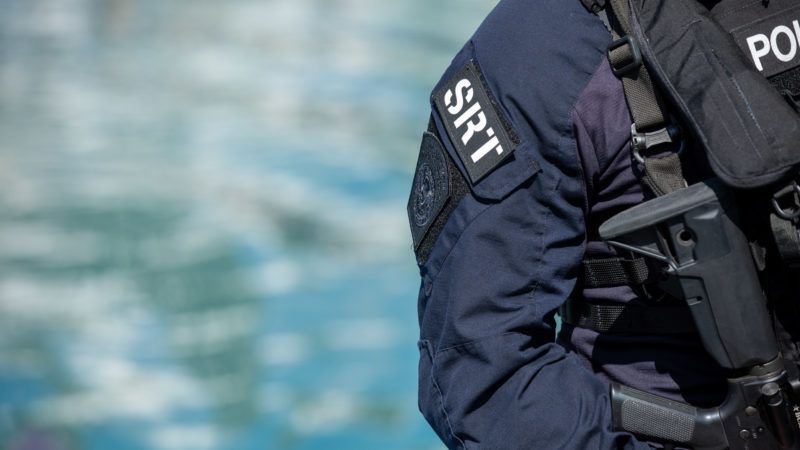Criminal Immigrant Prosecutions Declined Sharply After Jeff Sessions Left Office
Plus: navel-gazing student protesters, the new emblem of the culture war, and more...

Spike and drop. Last year saw a "sharp decline" in criminal immigrant prosecutions, according to the latest data from the Transactional Records Access Clearinghouse (TRAC) at Syracuse University. After spiking drastically in 2018, prosecutions are back down to Obama-era levels (which is still a lot).
The three major immigration enforcement agencies—Customs and Border Protection (CBP), Immigration and Customs Enforcement (ICE), and Citizenship and Immigration Services (USCIS), all housed within the Department of Homeland Security—can directly launch only civil enforcement actions; they must refer potential criminal to the U.S. Department of Justice. At that point, it's up to federal prosecutors to decide whether to pursue charges. "Trends for referred cases have been driven largely by CBP rather than by ICE or USCIS," according to TRAC, which has long monitored month-by-month and year-over-year enforcement of federal law.
In early 2018, CBP referred around 5,000 cases for prosecution. By October 2018, this had jumped to 13,286 referrals. The number started slipping in late 2018, and last year saw further decline.
The number of criminal prosecutions that immigration agencies referred to the Justice Department in October 2019 (the last month for which TRAC has data) was down 4.2 percent from the previous month and 37.4 percent from October 2018.
Immigration agencies are still referring a lot of cases—8,315 last October, to be precise. That's still significantly higher than in Trump's first year or the tail end of the Obama presidency. But it's on par with or lower than many of the per-month referrals from October 2009 through October 2014.
TRAC points out that "the trend in CBP-referred prosecutions does not map neatly onto the trend in Border Patrol apprehensions along the Southwest border. In fact, just as apprehensions began climbing sharply in March of 2019, criminal prosecutions began to fall."
So what can explain this?
We find that criminal referrals were driven not by rates of unlawful border crossing, but by policy decisions directing CBP and federal prosecutors to focus on specific crimes for federal prosecution. On April 6, 2018, then Attorney General Jeff Sessions announced a 'zero-tolerance policy' for those who 'illegally cross over our border'. Criminal prosecutions climbed as a result although they fell far short of their goal of zero tolerance. Criminal prosecutions at their height…were always far fewer than even the number of single adults arrested by the Border Patrol. And when parents arriving as part of family units are included along with single adults, only a minority of immigrants who crossed unlawfully were federally prosecuted.
After the resignation of former Attorney General Sessions who had personally championed prioritizing criminal prosecution of illegal entry offenses, prosecutions fell. Other demands for staffing time competed for attention. With limited investigative and prosecution resources, devoting more resources to prosecuting immigration offenses inevitably had meant fewer resources were available to pursue other types of federal offenses such as drug offenses, weapons, and white-collar crimes.
More here.
FREE MINDS
Have student protests gotten more inward-facing? And if so, why? Conor Friedersdorf and others offer some theories in this Twitter thread:
For reasons I don't entirely understand students seem to have shifted marginally away from outward-looking protests against war or Wall Street to inward looking protests circa 2015 premised on the assertion that their institutions were riven with systemic racism and sexism. https://t.co/U9ttzJZZdI
— Conor Friedersdorf (@conor64) February 13, 2020
FREE MARKETS
Accentuating the positive, for a change:
Globally, a worker could expect to work 2,227 hours in 1950.
By 2016, however, he or she worked only 1,855 hours.
Over the same time period, inflation-adjusted income per capita per year rose 111%.We are working less while making more money. https://t.co/F5awIMqCaE
— Human Progress (@HumanProgress) February 13, 2020
QUICK HITS
- My husband wrote a book, and here is an excerpt involving Donald Trump and badgers.
- Reason's Matt Welch, weighing in on the important issues:
That this is even a debate shows how broken we all are.
I am a habitual last-row-sitter, precisely because I #NeverRecline, not wanting to constrict people's space. I recognize that others do not share my preference, and I do not punish them for acting on it. This is not hard. https://t.co/vCYQ2ck52d
— Matt Welch (@MattWelch) February 13, 2020
- Is it just me, or does the culture war get dumber and dumber?
https://twitter.com/katierosman/status/1227262286265495565
- Sigh:
Translation: Juul hired outside firms to run web ads, the firms used automation to place ads on "millions" of websites, and some of those sites are ones kids might visit. But @nytimes is happy to make that sound maximally sinister. https://t.co/CzE4qWQPLi
— Jacob Grier (is not here) (@jacobgrier) February 13, 2020


Show Comments (241)